[ad_1]
“Namaste! The place are you going?” he shouts out. Or “What are you carrying?” in the event that they have parcels and luggage of their arms. Most days, he calls the neighbours’ drivers to sit down with him and discuss to them about work and politics.
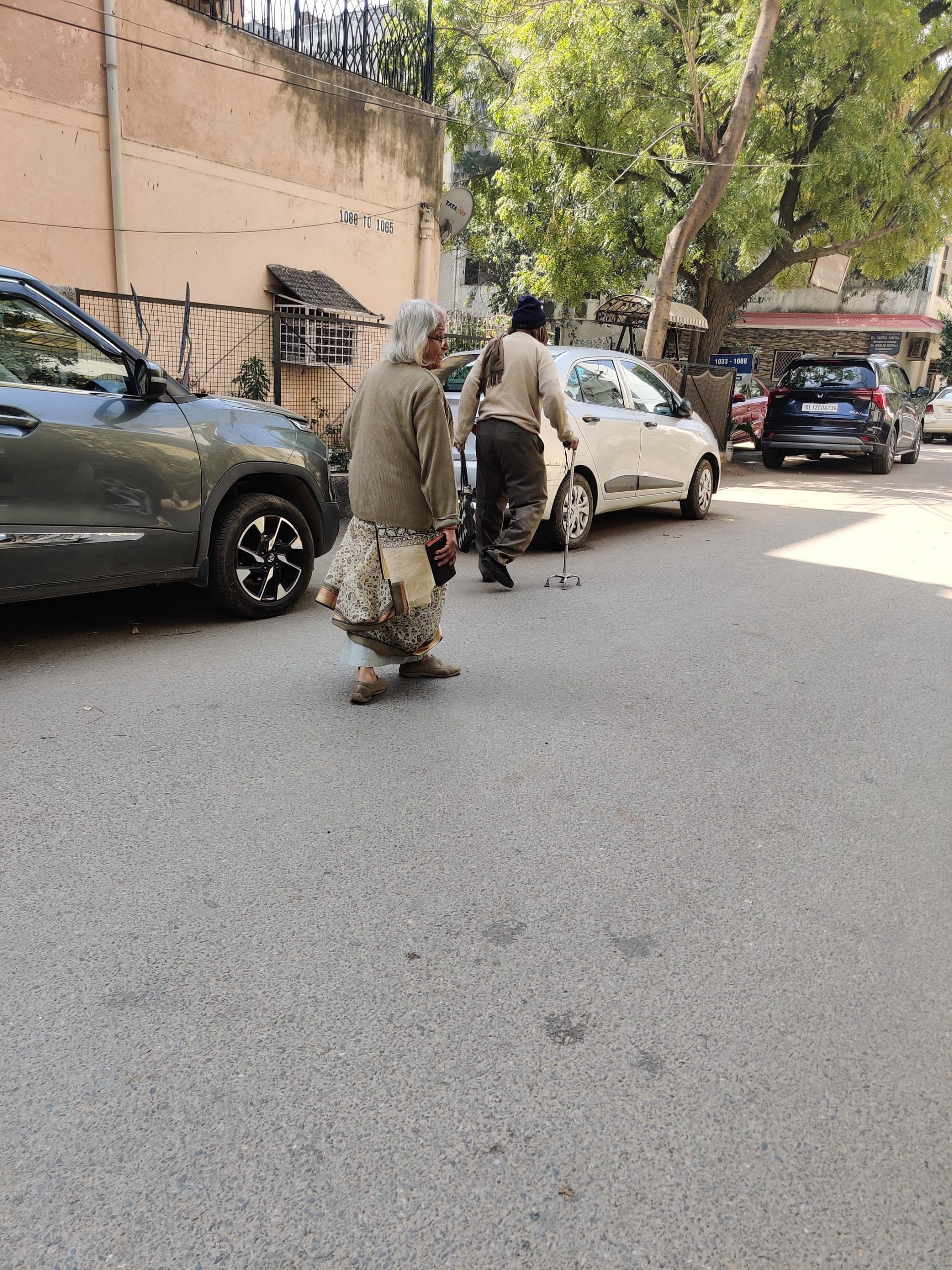
“Our weekdays and weekends all look the identical. We don’t even bear in mind how we spent most of our days. We have now the identical routine the place we eat, discuss to one another, and spend the entire day at dwelling,” Rai says.
When he has nobody to speak to from his veranda, he scrolls by his cellphone, studying information and checking his social media.
Geeta’s day is busier—family chores after her morning puja, breakfast primarily based on a weight-reduction plan plan given by their physician, and a visit to the market within the night to refill on groceries, fruits, and greens. Some days, her husband helps her with dusting and arranging the eating desk. With their solely little one residing in France together with her husband, Rai and Geeta are one another’s sole companions.
Right now, India’s aged inhabitants includes somewhat over 10 per cent of the nation’s 140 crore inhabitants. This quantity is estimated to extend to fifteen per cent (round 22.7 crore) by 2036 and double as much as 20.8 per cent (round 34.7 crore) by 2050. Rising life expectancy and reducing fertility charges are altering demographic equations throughout the globe, and India is about to face an ageing inhabitants bulge at a time when joint household traditions have damaged up and there’s no institutional care infrastructure both.
Older individuals in India are historically anticipated to detach themselves from worldly pursuits and immerse themselves in vanaprastha ashram. They attend RWA conferences and bhajans, take care of grandchildren, and even go for non secular retreats. There’s at all times the stereotype of laughter golf equipment in neighbourhood parks. However with WhatsApp, Fb, and limitless streaming content material, the supply of ‘gray pleasure’ is altering.
Their days are consumed by screens. A set routine is essential. Sending good morning messages, forwarding political movies, watching OTT throughout the day and ending the evening with Vivekananda and Ramana Maharishi inspirational quotes are getting extra widespread among the many center lessons.
Dharamwati Gautam, 76, relaxes on a mattress alongside her daughter-in-law as she strokes her white and brown cat, Bhura. It’s early night, nearing tea time. Within the adjoining room, her husband, Chhidda Singh Gautam, 81, watches information on a wall-mounted flat-screen TV. “Aditya, make tea for everybody,” he says loudly. Theirs is a busy family. The Gautams share their two-room kitchen home in Shahdara with their daughter-in-law and their grandsons. “My son died throughout Covid,” says Chhidda, pointing to a photograph of a younger man on the wall. It’s flanked by two images on both facet–considered one of BR Ambedkar and the opposite of Buddha.
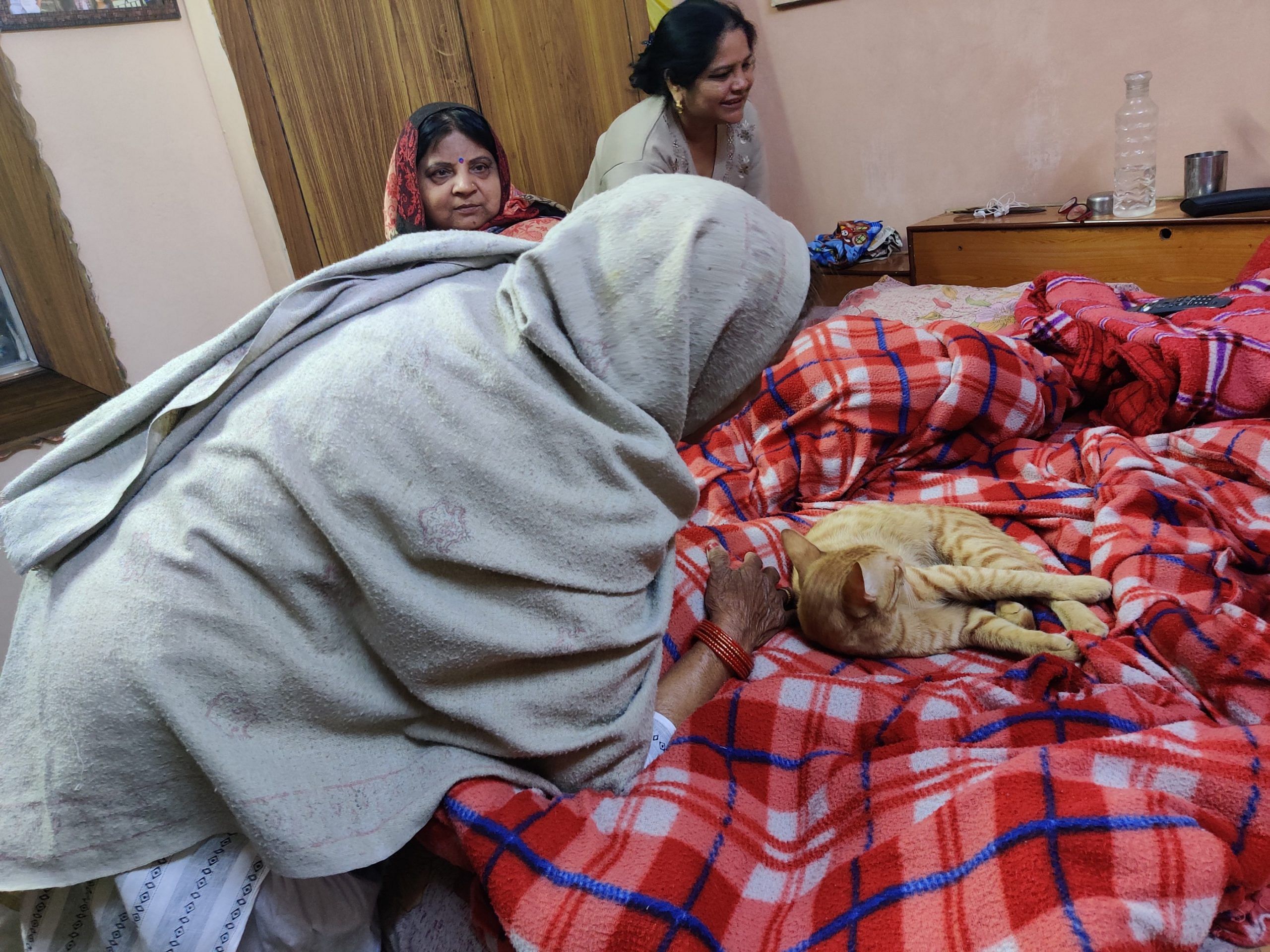
“The tea just isn’t candy,” he rumbles. However his daughter-in-law ignores his repeated requests for sugar. “He has diabetes. We lock all of the sweets within the bed room cabinet.” The drugs are on the shelf below the tv, in order that they received’t be forgotten.
Asia is dwelling to about 58 per cent of the worldwide inhabitants of older individuals.
Regardless of filial piety forming an integral a part of conventional Asian cultures, nations like China, Japan, and Singapore have heavily invested and pioneered fashions of well being and social look after older adults. However in India, aged persons are surprisingly lacking from public insurance policies, debates, and within the ballot season from political events’ election manifestos. Not like the give attention to empowerment of youth and girls, the necessity for geriatric care stays conspicuously absent from mainstream conversations.
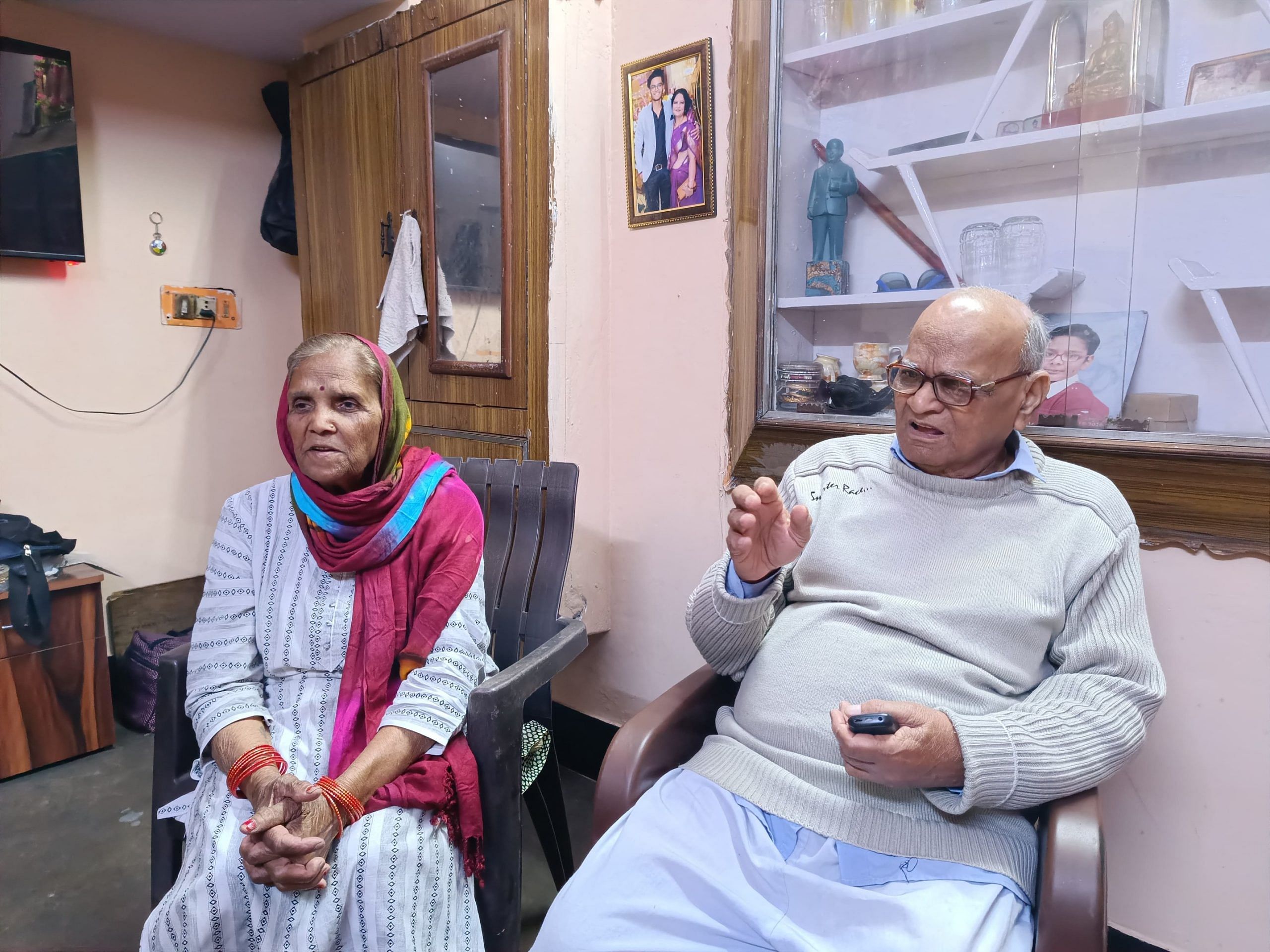
The twilight years of the Indian aged are sometimes spent in withdrawal from public areas.
“The federal government can assume that the issue of the aged is the issue of the households and vice versa. Nevertheless it’s not a single-handed method. It’s a many-hands method,” says Meera Khanna, president of The Guild of Service, a Delhi-based nonprofit organisation that works for geriatric welfare. She needs the Indian authorities to undertake a “holistic, 360 diploma” method to ageing.
“It may possibly’t be somewhat tinkering right here and there. If we’ve elevated longevity, it’s essential to improve the standard of their lives. What’s the purpose of a protracted life that’s horrible?”
Battling altering household patterns
Retired authorities faculty headmaster Hasmukh Sagar Sharma greets clients at his son’s grocery retailer with a large smile. The brightly lit Masterji’s’s Retailer in a Najafgarh bylane in West Delhi is a one-stop store for the whole lot—milk, ketchup, biscuits, dal, detergent, cereals, spices, notepads, and stationery. All his clients are native residents. “How are you masterji?” they ask him whereas grabbing the luggage with groceries and giving him the cash.
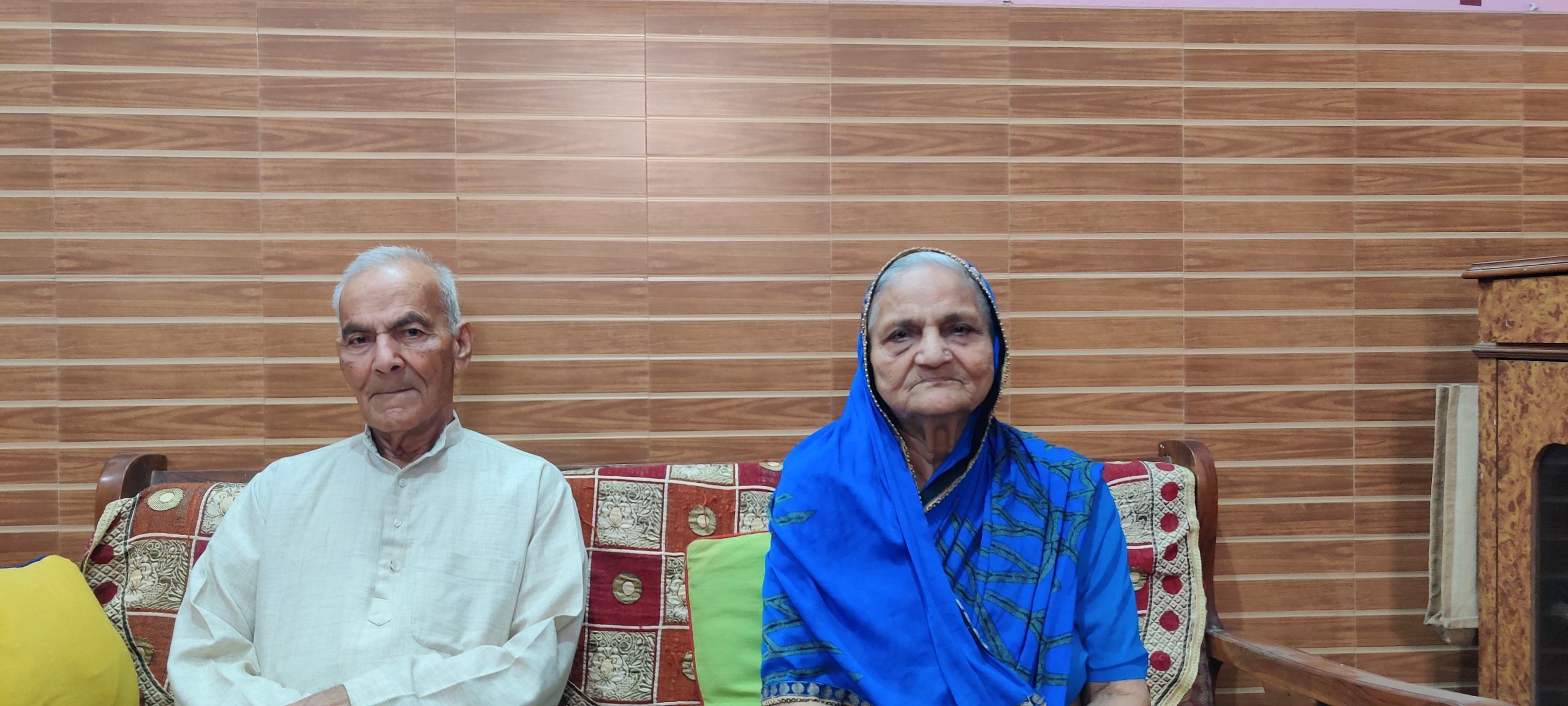
Hasmukh’s agility, alongside along with his well-trimmed hair, clean-shaven face, and virtually wrinkle-free face belies his age. He’s 79 years previous and has a each day schedule that may put a 20-year-old to disgrace.
It begins at 5:30 am when he walks by a connecting door from the lounge of his home into the shop. He has to get the milk provide and attend to the college students who purchase pens, pencils, and chips on their approach to faculty. The shop, which he manages alongside along with his son, is his window to the world outdoors. Folks come and go as they talk about politics, exams, and the rising price of residing.
This work has saved him occupied for the final 12 years. Not even a pension of Rs 40,000 might cease him from pursuing his second innings as a storekeeper. When it’s time for his afternoon nap between 1-2 pm, his spouse, Dayavati, takes over. Masterji’s retailer downs its shutters solely by 10 pm when everybody within the neighbourhood is again dwelling and their cabinets are stocked. By 11, the Sharmas name it a day.
At 77, Dayavati does all of the home tasks and cooks for the household of 5–they dwell with their son and two grandsons. Operating the home is a time-consuming job, however each Monday night, she visits the neighbourhood Shiv temple, meets fellow devotees, and sings bhajans.
The store is the axis of the Sharma household. When their son Rajesh misplaced his job at Maruti Suzuki’s Manesar plant after the violence in 2012, he arrange the shop adjoining to his home. A connecting door between the store and the Sharmas’ drawing room permits the aged couple to briskly navigate their dwelling and their industrial enterprise.
“We’re father and son however we dwell like pals. It’s all been potential due to my missus. She tells us to maintain smiling. My life’s motto can also be – be merry,” says Hasmukh.
He compares his son to the epitome of filial devotion, Shravan Kumar – the legendary Ramayana character who carried his aged dad and mom on pilgrimage in baskets suspended from a pole on his shoulders. Rajesh determined to stick with his dad and mom after his spouse left him.
He goes for night walks twice — one along with his father and the second time along with his mom, to whom he arms over the each day earnings.
“The well being of the older technology is much less impacted by illness and extra resulting from loneliness. I be certain my dad and mom assist me with the shop. That method, they spend time with me and assist with my earnings,” he says.
Studies have proven that India’s senior residents who dwell with their spouses and youngsters have excessive ranges of life satisfaction. Many are even open to shifting cities to be nearer to their working kids.
Parul* and Karan* have been very happy to maneuver to Gurugram in 2018 after residing in Noida for 25 years. They needed to be near their daughter and two granddaughters. With their son residing overseas, relocating was the subsequent best choice.
“Now, our daughter lives a couple of minutes away from us. Assembly our grandchildren provides us a burst of power,” says Parul, who’s in her late 70s. She tends to her two indoor gardens, retains in contact with pals from her previous neighbourhoods, and reads. In the meantime, Karan is busy constructing a digital picture stock of the household.
Their most awaited second is the go to of their two granddaughters, who’re 18 and 20. Collectively, they play board video games or watch a film on the theatre or on OTT.
“Generally we exit for lunch. They inform us about their actions. I give them some motivational discuss or inform them [about] previous occasions associated to their mom,” says Parul, who used to run a distribution enterprise of an American dwelling merchandise firm.
Within the prosperous Gurugram housing colony, which has a big inhabitants of returning NRIs, getting a physician or ambulance providers is a name away, facilitated by the foyer supervisor. Parul has noticed that a number of households are buying two items throughout the residential compound – one for themselves and the opposite for his or her dad and mom.
For the Gangals, whose two sons dwell within the United States, the CCTV cameras in each room of their Vasant Kanj duplex are a reminder of the fragility of age. However they like to have fun the passage of time. On 5 March, the Gangals marked their sixtieth wedding ceremony anniversary with a havan on the Arya Samaj in Vasant Kunj with a couple of members of the family and pals. It wasn’t as lavish as their fiftieth anniversary that was thrown by their two sons, full with an alternate of diamond rings.
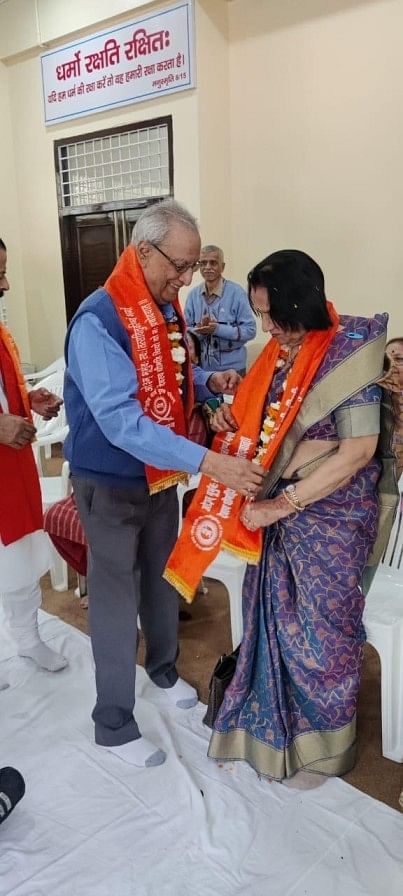
“This time we didn’t reward one another something. I feel I’m the largest reward for her as I survive my sickness,” jokes VK, who, at 87, is battling a kidney illness. Since his prognosis final yr, the Fortis Hospital at Vasant Kunj has develop into a giant a part of his life.
“Final yr, we confronted our hardest time when he virtually stopped respiration and was hospitalised for seven-eight days,” says the spouse, Santosh. “Drape your scarf correctly,” she tells him. VK will get up from the couch and goes to his bed room to carry out the album of their anniversary celebrations.
Three days every week, his driver takes him to Fortis Hospital. It’s a less-than-five-minute drive, however VK prefers to go alone. “I don’t need to hassle my spouse. And the docs, technicians, and employees on the hospital are very caring and good,” he says. He has a drawer stuffed with medical information which can be stacked in chronological order.
Santosh can no longer paint and knit–it strains her eyes; her fingers are shedding their grip. However she accepts the ageing course of with equanimity.
Indians, irrespective of sophistication, try to chart out a course for his or her ageing dad and mom with no blueprint. India, with its tradition of respecting elders and their lived experiences, is altering.
“The breakdown of the standard system of household, the affect of different cultures, particularly the give attention to the nuclear household, has modified the angle of society towards the aged. As an alternative of respecting their lived expertise, we began devaluing them,” Khanna says.
The shift isn’t restricted to city India. Earlier this month, throughout a chat on the challenges encountered by aged ladies on the India Worldwide Centre (IIC), retired IAS officer KN Shrivastava recalled an incident the place somebody from Uttar Pradesh approached him for assist with constructing an previous age dwelling in his village. “Neglect of aged dad and mom is occurring not solely in city India however it is usually rising within the villages, which is extra hurtful,” he mentioned.
Furthermore, the change in societal attitudes is happening in parallel to a coverage vacuum. Khanna contrasted India’s case by citing the instance of Singapore the place tax advantages are given to younger {couples} who purchase houses inside a specified distance from their mother or father’s houses.
“Taxpayers needs to be given advantages that make it simpler to maintain dad and mom. There’s the ‘sandwich technology’, which takes care of their aged dad and mom whereas caring for his or her youngsters. They want assist to facilitate this twin accountability,” she says.
Additionally learn:
Firm of partner and web
Instagram reels have popularised the idyllic retired life by the seashore or within the mountains–removed from the madding crowd. However the aged need to be within the thick of issues, flexing their age and knowledge.
Harvinder Singh, 75, will get to do exactly that on the faculty canteen he runs along with his spouse, Harjinder Kaur, in Shahdara. Like the Sharmas, the Singhs start their day at 6.30 am. There are sandwiches to arrange, samosas to fry and pastries to be laid out on the large canteen counter for hungry college students.
“We’ve been doing this for 21 years,” says Harvinder as his spouse, 68, oversees the 2 assistants answerable for getting ready the snacks. The canteen is for the Singhs what the grocery retailer is for the Sharmas – a supply of pleasure, fulfilment, and an outlet to work together with individuals.
After 45 years of marriage, the husband and spouse are specialists at studying one another—from the raised eyebrow to the half smile.
“Each time we argue, we by no means discuss to one another at that second. We discuss after two-three hours, which at all times solves the issue, and that’s the perfect key to our glad married lengthy life,” says Harvinder.
Self-discipline is a faith and protecting busy, a ritual—one which anchors them to the current as an alternative of meandering down the paths of ‘what ifs’ and ‘what thens’. And in contrast to the sandwich technology hooked to their smartphones and tablets, consuming reels and clips for hours on finish, for the Singhs, the cellphone is a software to be in contact with their kids, prolonged household and pals. Theirs is a technology that values real-life interactions.
The Daruwalas might have an 18-year age hole between them, however there’s at all times one thing to speak about. Sam Manekshaw’s daughter, Maja Daruwala, a lawyer and human rights activist, is 78 whereas her husband, Dhun, is 96. They’ve a rhythm, one which took years to develop.
Maja, presently the chief editor of India Justice Report, mentioned there was a “want for creating stability” in their pursuits and power. However their completely different personalities—Maja together with her go-with-the-flow nature and Dhun being the extra disciplined one–have precipitated tensions prior to now.
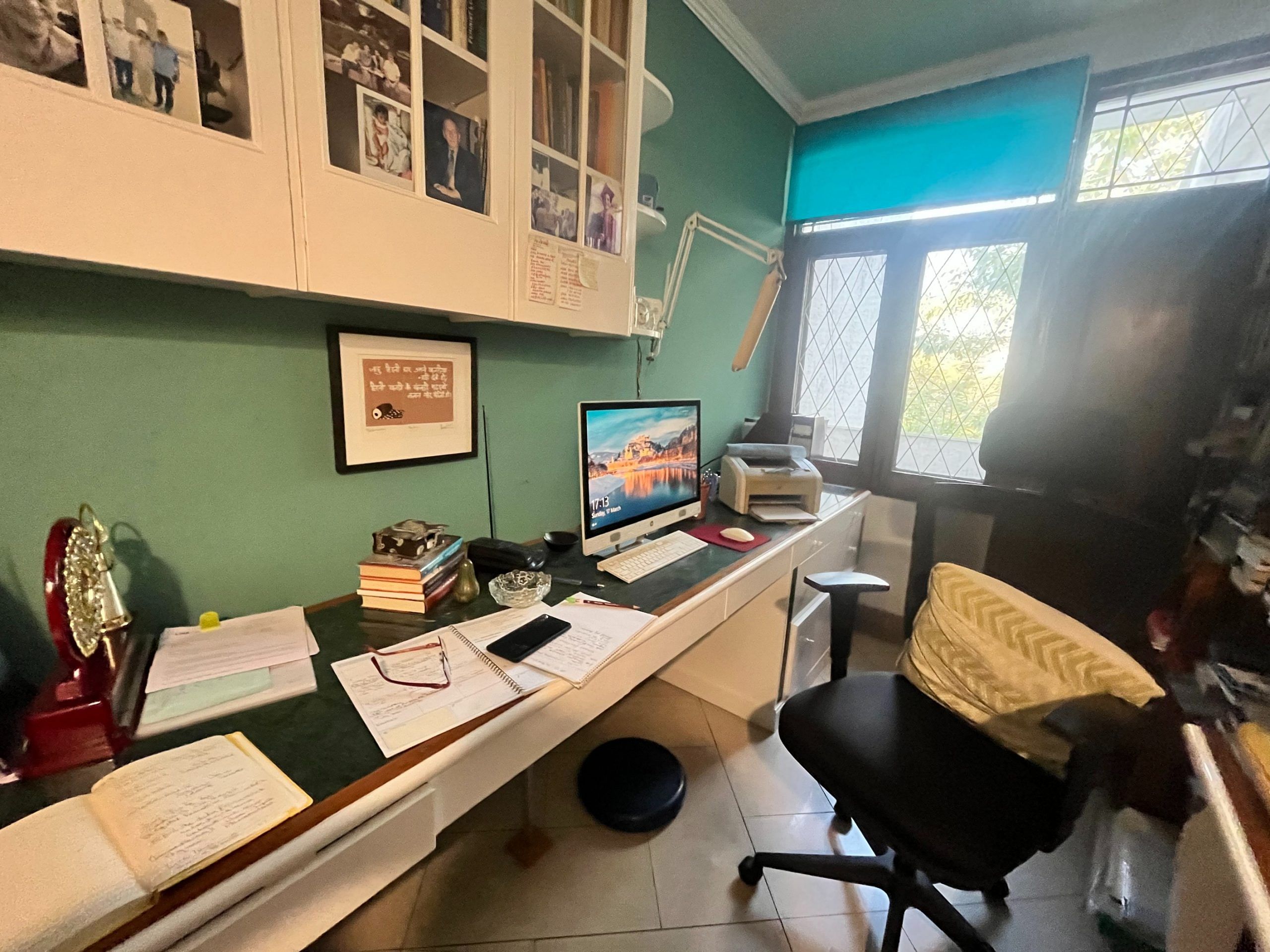
“After we have been youthful, it was once an space of battle with my husband. He was extra regulated. There was once large and little niggles right here and there. However we’ve discovered to accommodate one another’s nature,” says Maja.
The technology that waited for the mailman and made ‘trunk’ calls to relations overseas has embraced expertise and the web.
Subhash Chandra begins his day by responding to good morning messages. Santosh Gangal seems to the web for her each day doses of non secular and well being suggestions and good morning quotes in her Arya Samaj, Mahila Samaj and Vedik Prachar WhatsApp teams.
And Maja talks concerning the “large accessibility to group and immediate communication” by way of WhatsApp. At her age, she delights in info, leisure, and companionship that one can get pleasure from by the web.
“Beforehand, we needed to anticipate tatkal and trunk calls, which took a lot time, however now, I can communicate to individuals with out having to attend. I communicate to my sons and grandchildren, who’re distant from Delhi, on a regular basis. I discuss to my sister over the cellphone daily,” she says.
Additionally learn:
Nostalgia and an ‘unshared’ worry
The Daruwalas’ Hauz Khas residence is geriatric-friendly. Their two-storey constructing, the place they dwell on the highest ground, has a elevate. In addition they have two long-time home aides to handle home chores. On a spring day, Maja deftly balances work in her examine whereas attending to her husband in one other room, who is feeling slightly below the climate.
“Would you like a toast or anything to eat?” she asks her husband. In a feeble voice, Dhun opts for a toast, and Maja relays the vital directions to the helper.
Again in her examine, a shelf stuffed with books sits above the examine desk full with a giant desktop and printer. Household images of her dad and mom, Sam and Siloo Manekshaw, sister, youngsters and husband are positioned between the wooden and glass panels of the shelf.
It’s been Maja and her husband for nearly 30 years since their two sons left for school. On some days, they entertain themselves by enjoying a couple of video games of playing cards or watching TV collectively. Often, they go to their pals or attend a lecture on the IIC.
Eight years in the past, Maja left the Commonwealth Human Rights Initiative she had headed for twenty years. “However in my thoughts, I by no means retired. My hope is that I could be helpful to society and the individuals near me till the very finish,” she says.
But, a lingering concern usually occupies her ideas – her husband’s retired life. Reflecting on Dhun’s intensive profession spanning over 4 many years, throughout which he ascended from an unpaid apprentice in Air India to a seasoned coaching flight engineer, Maja acknowledges that “retirement should be an actual trial” for such an “lively and accountable” particular person.
Whereas the ephemerality of life echoes most profoundly among the many geriatric group, Maja sheds mild on a worry hardly ever addressed by the aged – the apprehension of falling in poor health. The shadow of a frail physique lurks ominously behind the attract of boundless time and leisure.
“One facet that aged people hardly ever talk about is the dread of sickness. They worry the lack of dignity, management over their physique and family, and the prospect of dependence on others. Nobody needs to burden their household.”
She asserts that each she and her husband have a powerful work ethic within the sense that each one actions needs to be anchored in a public objective. However that “sense of usefulness can get misplaced” as soon as individuals develop previous and their colleges diminish.
Then there’s the load of nostalgia and the ache of seeing family members go away.
“Longevity can put on one down. You might be watching lots of people you like die. When persons are of their 30s or 40s, the whole lot is constructive and everlasting, however the older you develop, the whole lot will get somewhat sadder. There are extra funerals and hospital visits and also you realise your individual mortality,” she says.
Again in Vasant Kunj, Geeta Rani and Chandra Rai prepare for his or her 6 pm ritual. Geeta rapidly will get a pot of tea going, whereas her husband settles on the sofa. He’s completed speaking to the passersby and drivers.
“This indulgence of his typically attracts undesirable consideration,” she says. Often, neighbours and shopkeepers query why her husband appears perennially irritable. She clarifies he’s not at all times indignant however has a loud voice and “likes to speak over individuals”. Her reply elicits a smile from Chandra Rai.
Because the clock strikes 6, she joins her husband in entrance of their classic, box-shaped tv.
“Within the night, we watch Bengali serials collectively, have tea and snacks and discuss concerning the exhibits. Though we spend the entire day collectively, this time appears to be greatest for us,” says Chandra with a smile.
(Edited by Humra Laeeq)
[ad_2]
Source link





